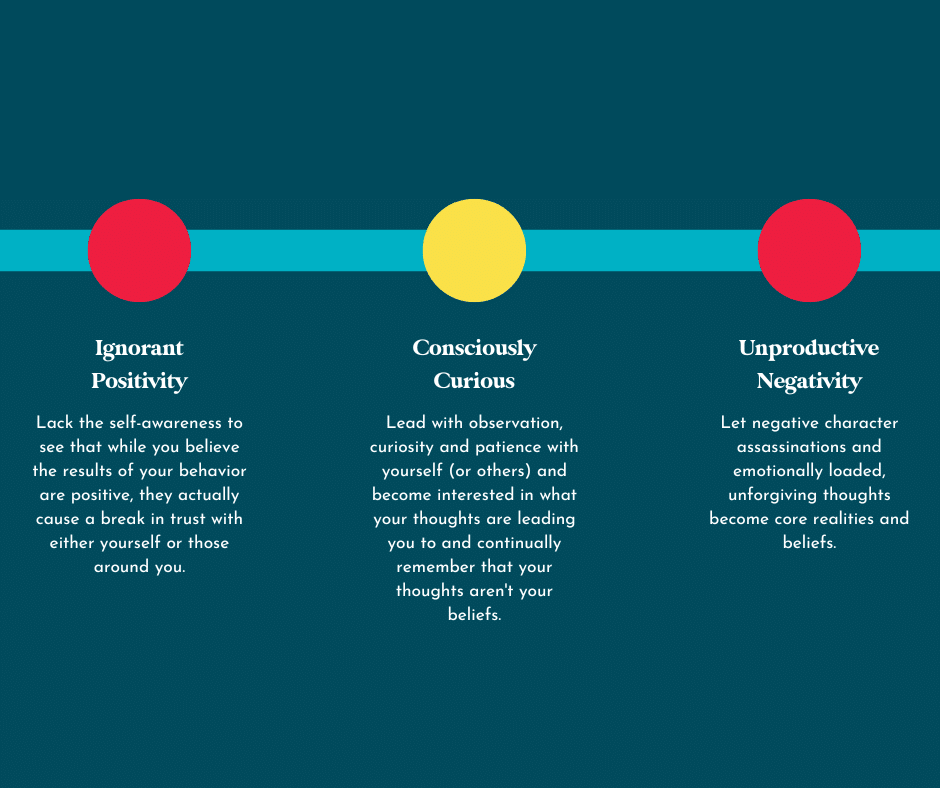“You did it again. You can never keep up with anything. You are so absent-minded.”
I had been on a 5-day work trip, coming home from the west coast on a red-eye flight.
I had just delivered an important speech that I needed to nail.
My husband had been on a trip for 14 days, and I was single parenting.
My mom had traveled home from graciously keeping Smith while I was gone, and I was alone with my four-year-old snuggled in bed, reading while he watched a show. I went to the fridge to grab his cup of chocolate milk, got back into bed, and reached for my highlighter.
I left the highlighter in the kitchen.
“You did it again. You can never keep up with anything. You are so absent-minded.”
It wasn’t an extraordinary moment. I wasn’t faced with a life-altering choice or facing a movie-scene moment.
Objectively, I was kicking major ass. Subjectively, my thoughts were telling me a different story.
I suddenly saw what this fleeting, simple moment was: the perfect example of the often unnoticed, frequently repeated words that illuminated what my brain often heard in these small, in-between moments.
Let me tell you some of my greatest hits that I soon noticed:
- My two go-tos:
- “You are so lazy. This is why you never reach your goals.”
- “Here you go again. You never follow through.”
- “Why do you think anyone even notices you didn’t write in March. You’re not that important.”
- “Well, you were undisciplined with that pizza last night, time for a hard workout to help make up for your indulgence.”
- [after looking in the mirror and thinking I look cute] “Who are you for liking what you see? You’re so full of yourself ,and you’re a size 10 inching to a size 12. Come back down to earth.”
The Dance of Self-Talk
Our inner voices are a dance between our conscious thoughts and deep-seated beliefs. There isn’t much conclusive research on our inner voices, but we know that self-talk activates brain regions responsible for language processing, emotional regulation, and decision-making.
Both positive and negative self-talk has been shown to affect motivation, executive function, and performance. Positive self-talk encourages connectivity in the reward networks of your brain. Negative self-talk can make it harder to cognitively process what is happening in the external world.
How Do We Define Negative Self-Talk?
I think about self-talk in a continuum because we don’t always define negative and positive in the same way.

Some “negative” self-talk can be helpful if your focus is on the behavior and not you as a person. When negative self-talk begins engaging in character assassinations, so-called self-fulfilling prophesies happen, and your behavior plays out your beliefs.
But conversely, if you lack the self-awareness to see that what you believe is “positive self-talk” results in behavior that breaks the trust in yourself or others, you will end up hurting relationships and potentially stunting your own growth.
| Productive: | Unproductive: |
| Focus on a meaningful behavior that has a consequence and a solution. | Focus on behaviors with no real consequence, no measurable solutions, and are disconnected from reality. |
| Observe yourself with interest and ask yourself questions. | Engage in character assassinations because you can’t come up with a meaningful argument about the impact of this behavior. If you have nothing to say but mean things, it’s a good indicator that you’re playing victim. |
| Act with curiosity about where a belief or behavior comes from. | Ruminate on emotionally loaded statements that bring up painful memories. |
| Be grateful for the opportunity to learn. | Be unforgiving. |
Addressing Unproductive Negative Self-Talk
Addressing my unproductive negative self-talk is a big-time area of focus. I find that it’s not in big moments I struggle with negative self-talk but in small moments of annoyance and inconvenience.
Here is what I have found super helpful:
1. Mindfulness – In the past two months, my mindfulness practice has moved from something on the to-do list to something I must have. I think this happened because an overall shift in how I’m experiencing what self-care actually is. It’s not a routine or even a practice; it’s a belief. A belief that you are worthy of taking care of. Because of this change, I’ve been more consistent with sitting for 10 minutes at some point throughout the day.
2. Questioning my thoughts – I think I’m better at catching and challenging this endless negative self-talk as a result of a more consistent mindfulness practice. I’ve been surprised by HOW MUCH it happens throughout the day. I try to think through three questions:
- Am I well-rested and in a good place mentally to see things clearly, or do I need to write this down and return to it?
- Does this behavior I’m judging have any consequences or am I just annoyed?
- What would I say to anyone else in this situation right now?
3. Reframing with something realistic – There are two situations I frequently find myself in:
- The first is that I realize that I’m just annoyed and making things bigger than they are. In these cases, I reframe with what it is. Here is an example using the highlighter story from above:
- Mae, you left the highlighter in the other room because your brain is focused correctly on more important things. Don’t sweat it. Get up and go get the highlighter.
- If I get to the point where I realize that I’m negatively talking to myself about something I truly do want to address, I have to reframe with something more realistic. Let’s use the pizza example: “Well, you were undisciplined with that pizza last night; time for a hard workout to help make up for your indulgence.”
- Mae, how good was that pizza you enjoyed last night with John? I see your body is feeling a little bit bloated and sore this morning, it may make your joints feel better if you make sure to drink a bunch of water and do a little gentle yoga.
We Deserve Better
There are many very uncool things about being an adult. But one amazing thing about it is that we get a choice. When I reframe, I always call myself Mae because that’s what my family and close friends called me when I was a child. We have the awesome ability to reprogram some of these automatic ways of thinking that probably once kept us safe, but that now hold us back.
It’s time to stop letting our bullshit thoughts run our lives and hold us back from living in a reality that better reflects who we truly are. Let’s start by recognizing and questioning our negative self-talk. Is it really true? Does it serve us? We must be kinder to ourselves and treat ourselves with the same compassion and understanding we offer others.



